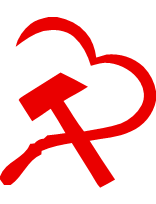
Cowbee
Elementary Principles of Philosophy by Georges Politzer is my favorite intro to Dialectical and Historical Materialism, and it's hosted on ProleWiki. It starts with Idealism, Dialectics, Materialism, Dialectical Idealism, then Dialectical and Historical Materialism.
Do you have a specific, non-Marxist interest in philosophy?
Thanks, comrade! 
The productive forces largely move independent of individual ideas, but by real, physical mechanisms. Marx believed Socialism to succeed Capitalism not because of an inherent idea of moral superiority, but because Capitalism naturally forms monopolist syndicates, centralizing and socializing itself, making itself ripe for public ownership and management. This is why Marx and Engels repeatedly stated that Private Property could not be abolished overnight. The role of the DotP is to wrest from the bourgeoisie its Capital as it has socialized, steadily increasing and socializing the productive forces.
This is why Marx says the bourgeoisie produces, above all else, its own gravediggers. I recommend reading the article I linked, the author also has another article called Socialism Developed China, Not Capitalism. Mao was able to develop the productive forces, but due to socializing too early there were recessions and struggles. This was a left-deviation, Maoism as Marxism-Leninism applied to China's conditions had reached a less useful stage, where Deng moved rightward, back as Marxism-Leninism applied to China's conditions of the late 20th century, and now Xi is a reversion to a leftward point now that China is socializing more and more and exerting more control over their markets, in a sort of birdcage model where Capital can only move with their consent in plans and lines directed by the CPC. Deng's analysis using Marxism-Leninism served its purpose, as did Mao's, both served critical points in the PRC's history before being succeeded by new analysis for new material conditions.
I'm sure a more well-read comrade will be able to offer better explanations, however.
It's generally an Ultraleft position that is convenient to take for Western "Leftists." The Dengist reforms were a return to Marxism as opposed to the later end of the Maoist era, where they tried to implement Communism more by decree than degree. Establishing Communism based on fiat goes against Historical Materialism.
The reason it's convenient for Western "Leftists" is because it supports US Imperial Hegemony, so these views aren't as heavily combatted by Western media. It's idealist, not materialist.
There's a little hammer and sickle north of it, though NATO-nerds are trying to erase it
My.personal favorite intro is Georges Politzer's Elementary Principles of Philosophy. Politzer goes over the history of philosophy and how different schools of thought changed alongside modes of production, until Dialectical and Historical Materialism.